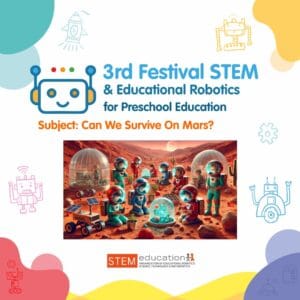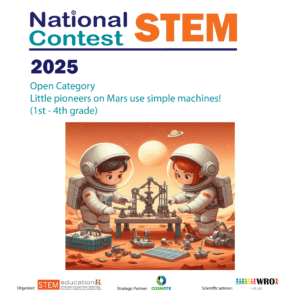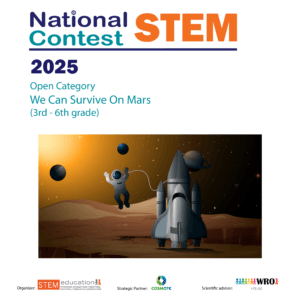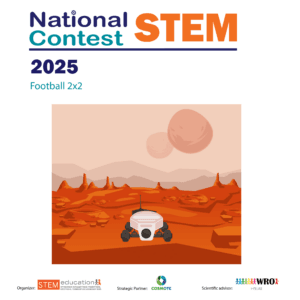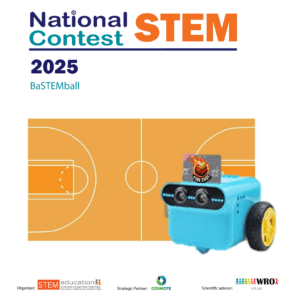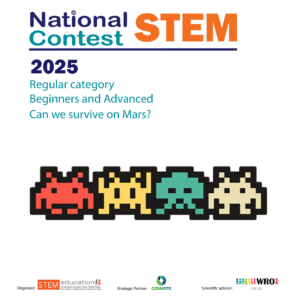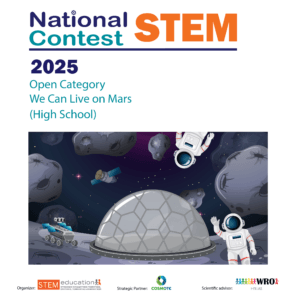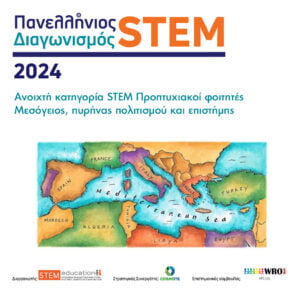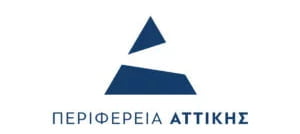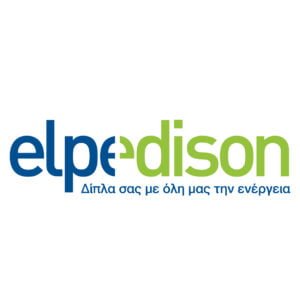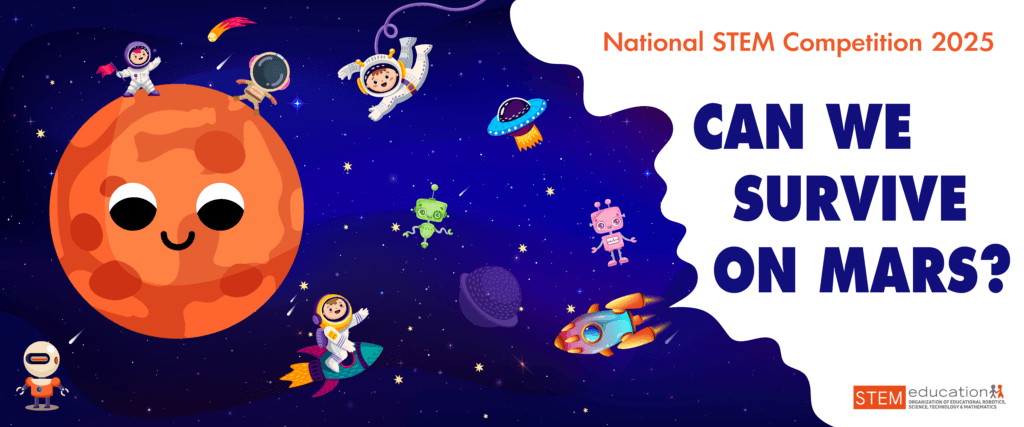
We are entering the second decade since hundreds of students from across the country responded to our call and participated in the 1st National STEM Competition with the theme “My Own City.” This year, the competition’s theme is “Can We Survive on Mars?”
Over the 11 years that have passed, the competition has grown significantly. Initially, participants competed in their respective regional headquarters across the country, and those who advanced moved on to the national competition.
The key elements of the competition are:
– The journey to the competition. Teams have six months to prepare and present their projects, based on the competition’s theme.
– How students form teams, the role of the mentor-coach, the involvement of parents, and time management.
– Free training for teams, especially for the coaches.
– Analyzing the competition topic, exchanging ideas, managing sources for in-depth exploration of the subject, the team’s decision-making, and ultimately, the implementation of the team’s idea with each member taking on roles and responsibilities.
– The free and continuous transfer of knowledge from educators to educators, from one competition to the next.
This is a unique way for young students to understand natural sciences, programming, and automation, to think like engineers, develop their problem-solving skills, and expand their creativity, turning them into engaged and active citizens. Ultimately, participants, especially students, gain confidence through knowledge.
The competition lays the foundation for understanding significant concepts in Physics, Mathematics, and Engineering for all ages in compulsory education, such as:
– The introduction of simple machines.
– The introduction of measurements in primary school.
We complete eleven years of active presence in the educational community, with this effort becoming the largest student event, which essentially:
– Supplements the curriculum.
– Introduces the STEM methodology into the educational process.
– Applies and spreads knowledge across the country.
With the active support of our strategic partner, COSMOTE, we have equipped dozens of primary schools and trained hundreds of teachers for free, an unprecedented event in our country.
The National Competition promotes STEM as a methodology for compulsory education and outlines how students will acquire 21st-century skills. The educational community, from Kindergarten to Middle School, is invited to participate in the competition to contribute to Greece’s alignment with technologically developed countries—a fact evidenced by the quality of the projects from hundreds of students nationwide.
Ioannis Somalakidis
At the same time, as part of the National STEM Contest, free training seminars will be held for the coaches of the teams that will participate in the competition.
Subject: Can We Survive On Mars?
Mars, often referred to as the “Red Planet,” is the fourth planet from the Sun in our solar system. It was named after the Roman god of war due to its reddish appearance, which is caused by iron oxide, or rust, on its surface. Mars is about half the size of Earth and has a thin atmosphere primarily composed of carbon dioxide. Its landscape is diverse, featuring the largest volcano in the solar system, Olympus Mons, and a canyon system called Valles Marineris. Mars also has polar ice caps made of water and carbon dioxide, which change with the seasons, indicating a dynamic environment.
The exploration of Mars is of paramount importance for several reasons. First, it offers a unique opportunity to understand the history of our solar system. Mars shares many similarities with Earth, such as the length of its day and the presence of polar ice caps, making it a valuable comparison for studying planetary evolution and climate change. By analyzing Mars’ geology and atmosphere, scientists hope to uncover clues about the planet’s past, including whether conditions were ever suitable for life.
Moreover, Mars exploration is crucial for the future of human space exploration. As the nearest planet that could potentially support human life, Mars is considered the next frontier for human colonization. Establishing a human presence on Mars could serve as a stepping stone for further exploration of the solar system, providing valuable experience in long-term space travel and living in a hostile environment. This could pave the way for exploring more distant celestial bodies, such as Jupiter’s moons or even other star systems.
In addition, Mars offers potential economic opportunities. The planet may contain resources such as water, minerals, and possibly elements that are rare on Earth. These resources could be used to support human colonies on Mars or be transported back to Earth, opening new avenues for space economies. The technological advancements required for Mars exploration could also lead to innovations in various fields, from robotics to renewable energy, with benefits extending beyond space exploration itself.
Welcome to the official forum of the National STEM Competition.
TERMS OF USE: In the event of a member posting content to the group, the member must ensure that:
– The elements and content posted in the group should not offend, defame or insult other members of the group, other visitors to the website and the Internet in general, as well as to follow the laws, good manners and manners of using the Internet.
– Given the nature of the group, all content posted by each member must be free of inappropriate content
Content posted must:
– To be characterized by respect and ensuring the freedom of expression of each member of the group and the Internet in general.
The administrators of the group have the right, if they become aware, to remove from the group material or part of material, which violates this regulation.
If a member of the group notices anything that they consider to be against these rules, they can inform their administrators about it.
COMPETITIVE CATEGORIES
The National STEM Contest is open to students from all academic levels throughout Greece. Different educational goals are established for each level, resulting in distinct competition categories and standards.
The main goal of this year’s challenge is to integrate abstract scientific information with students’ daily lives while also emphasising the necessity of engineering concepts in modern living. It is also necessary to comprehend the historical development of this way of life as well as the significance of the advent of rudimentary machines in this process. The aforementioned is intended to be accomplished by emphasising the connections between abstract scientific notions such as “force”, “motion”, “friction”, and “pressure” and the operating principles of simple devices and people’s desire to make their lives easier.
The physics underpinning several of the six simple devices included in the challenge (wedge, inclined plane, lever, wheel, and pulley) were quantified by the Greek philosopher Archimedes (ca. 287-212 BC). When used and combined, these machines can provide people with an even greater mechanical advantage, as in the case of a bicycle or an automobile.
JUNIOR HIGH SCHOOL
Registration Form
(***The number of entries equals the number of teams you wish to enter. Lately you will need to upload the parental consent form and add it to your form completed, one for each student.)
Strategic Partner
Frequent questions
Deadline for submission is February 29, 2024
The webinars will be held remotely via the Microsoft Teams platform.
A participation certificate will also be given, and the event is, of course, free.
The link is sent shortly before the training. It's a good idea to check your spam as well.

